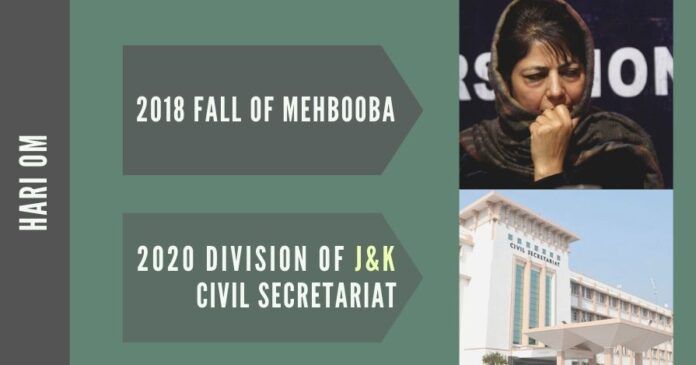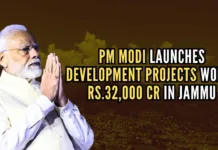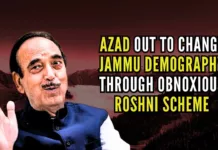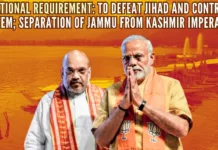
The steps which the Modi Government took and thereafter undoubtedly brought the whole secular lot to the nation’s knees and sent a clear message to the international community
June 19, 2018, was an epoch-making day in the political history of J&K. That day, the Narendra Modi Government in a dramatic brought down the separatist and terrorist-friendly and anti-Jammu and anti-Ladakh Mehbooba Mufti Government. She was signing certain files in the Civil Secretariat when the then Chief Secretary, BB Vyas, told her that the BJP had withdrawn support to her government. The historic decision of the Modi Government was hailed by all, barring those who had been exploiting democratic exercises and misusing political power since 1951 to subvert the Indian State from within and outside, promote overtly and covertly fissiparous tendencies, further the cause of Pakistan in J&K, snatch everything from Jammu and Ladakh and erode and destroy their distinct identities and personalities through obnoxious legislative measures and nasty executive orders calculated to giving a particular orientation to the administration, excluding Jammu and Ladakh from the job sector and political and financial institutions and changing the demographics of these two strategically located regions with a view to establishing “Greater Kashmir”.
The manner in which the Modi Government dethroned Mehbooba Mufti, who, like many others in Kashmir, including Farooq Abdullah and Omar Abdullah and Ghulam Nabi Azad, had repeatedly said that there would be no one in the state to give his/her shoulder to the national flag in case the Union Government tinkered with separatist and communal Article 370 and illegal and discriminatory Article 35A even slightly, was an indication that it meant serious business in the sensitive border State of J&K. The developments which unfolded after her humiliating fall further established that the Modi Government had diagnosed the Kashmir’s ailment. Some of the landmark steps included the ban on Jamaat-e-Islami and JKLF; reopening of cases against the enemies of the nation like Yasin Malik; arrest of 100s of separatists and terrorists; abrogation of Article 35A, Article 370 and separate J&K Constitution framed by the 100% rigged Constituent-cum-Legislative Assembly; removal of the state flag from the Raj Bhawan, the Civil Secretariat and all government offices and bifurcation of J&K into UTs of J&K and Ladakh.
The government asserted that the “arrangement has been made purely in view of the extent and spread of Novel Coronavirus (COVID-19) in the Union Territory and to ensure that people don’t face difficulties in obtaining services…because of restrictions on the inter-province movement”.
Indeed, the Modi Government took many remarkable steps to undo the grave wrongs committed by the Congress, the Abdullahs and the Muftis to bring the state at par with other states and UTs of the Union. The Congress, the Abdullahs, the Muftis, and a whole lot of secularists in Kashmir and Delhi and their handful of henchmen and cronies in Jammu had never ever considered J&K as an integral part of India. They all along considered it a disputed territory and vouched for trilateral talks between India, Pakistan, and Kashmiri Muslims. They considered Jammu and Ladakh irrelevant and as Kashmir’s two colonies where the people’s life was not one of the political and economic aspirations. The steps which the Modi Government took on June 19, 2018, and thereafter undoubtedly brought the whole secular lot to the nation’s knees and sent a clear message to the international community that India was a sovereign nation in the real sense of the term and that it was constitutionally bound to do what it did in J&K.
And on June 17, the Modi Government took yet another historic step to break the monopoly of Kashmir over the state polity and appreciate the feelings and concerns of the grossly ignored and discriminated against people of Jammu province. The government for the first time in 148 years divided the Civil Secretariat so that the people of both the provinces could get their work done in their own respective province. In fact, the government implemented its Order No.626, dated June 8, 2020. The said order had directed that the “Darbar Move offices for the Summer Season-2020 will formally open at Srinagar – the summer capital of J&K UT, on July 6” that “the Civil Secretariat will continue to remain functional at Jammu and employees shall work on ‘as is where is’ basis”[1]. Of course, the government asserted that the “arrangement has been made purely in view of the extent and spread of Novel Coronavirus (COVID-19) in the Union Territory and to ensure that people don’t face difficulties in obtaining services…because of restrictions on the inter-province movement”.
The landmark Order on the new arrangement divided departments at the Civil Secretariat-level between two capitals of the UT Territory of J&K with 19 departments along with their Administrative Secretaries and records will function from Srinagar Secretariat and 18 departments, along with all records, from Jammu Secretariat. It needs to be underlined that the June 8 Order had clearly said that “all the departments will function from both the locations for which Administrative Secretaries will make necessary arrangements, especially at the senior level to ensure the functionality in their respective departments both at Srinagar and Jammu”.
As per the Government Order No. 649-JK(GAD) of 2020, dated June 17, 2020, Animal/Sheep Husbandry and Fisheries; Training; Cooperative; Disaster Management, Relief, Rehabilitation and Reconstruction; Election; Food, Civil Supplies, and Consumer Affairs; Forest, Ecology and Environment; Health and Medical Education; Home; Housing and Urban Development; Information; Jal Shakti; Planning, Development, and Monitoring; Revenue; Rural Development and Panchayati Raj; Transport; and Tribal Affairs Departments will function from Jammu Civil Secretariat. As for the 19 departments which will function from the Srinagar Secretariat, these include Civil Aviation; Culture; Estates; Finance; Floriculture; General Administration; Horticulture; Higher Education; Hospitality and Protocol; Industries and Commerce; Information and Technology; Law, Justice and Parliamentary Affairs; Labour and Employment; Public Works; Social Welfare; School Education; Skill Development; Tourism; and Youth, Services and Sports Departments.
The J&K Apni Party has said: “The move is fraught with dangerous ramifications”. Both the outfits have demanded immediate withdrawal of the Civil Secretariat division order and asked the government to shift all the departments to Srinagar, without any exception, and without any delay.
As far as the Departments of Agriculture Production and Science and Technology Departments were concerned, the June 17 Order reflected them in both the Secretariats – Jammu Secretariat and Srinagar Secretariat. Why? Because it’s not clear. There are potent reasons to believe that the government will make a decision in this regard sooner than later to avoid confusion.
Now that the government has made 18 departments functional at the Jammu Civil Secretariat, it’s time for the powers-that-be to provide adequate staff so that all these departments function effectively and meet the people’s needs. It’s not a secret that the number of employees from Jammu province working in the Civil Secretariat was just negligible, about 15 to 20% of the total strength of over 2,000. In other words, 80% of the Secretariat employees belonged, and belong, to Kashmir. If credible sources are to be believed then it can be said that “all the 60 Safai Karamcharis in the Secretariat were from Kashmir”. The government has to provide adequate staff to the Jammu Civil Secretariat and they have to be from Jammu province.
Not just this, the authorities have to accept the historic judgement of the J&K High Court on the archaic institution of Darbar. The verdict had said in unambiguous terms that this expansive practice must be abandoned, that “decentralization of powers between the regions (Jammu province and Kashmir) is a basic issue” and that the practice “has neither contributed to the economic development of the state nor has it contributed to the emotional integration”.
In sum, it could be said that the June 17 Order will help the people of Jammu Province obtain the status of statehood and help New Delhi deal with Kashmir and separatists and terrorists in Kashmir more effectively.
P.S as was expected, the Kashmir-based National Conference of Farooq Abdullah and J&K Apni Party of Altaf Bukhari, which are dangerous than separatist outfits, have denounced the Modi Government’s decision. The National Conference has said: The division of Civil Secretariat-level departments between Jammu and Srinagar will “fester alienation in Kashmir”. The J&K Apni Party has said: “The move is fraught with dangerous ramifications”. Both the outfits have demanded immediate withdrawal of the Civil Secretariat division order and asked the government to shift all the departments to Srinagar, without any exception, and without any delay.
Note:
1. The views expressed here are those of the author and do not necessarily represent or reflect the views of PGurus.
References:
[1] Darbar Move: J&K Govt pays Rs 6952.338 lakhs to 10,112 employees every year for no work – May 24, 2020, PGurus.com
- ‘Kashmir My core constituency’: Revisiting July 12, 2003 to understand politics, Omar Abdullah-style - March 15, 2024
- Total deviation from traditional approach: Seven takeaways from PM Modi’s March 7 Srinagar visit - March 9, 2024
- Status of political parties: Why is further J&K reorganization imperative? - March 1, 2024










